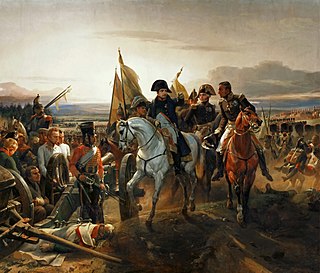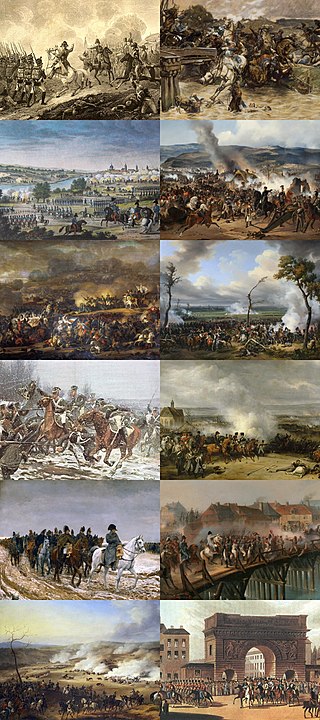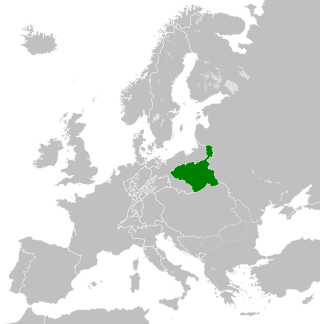| Battle of Herceg Novi | |||||||||
|---|---|---|---|---|---|---|---|---|---|
| Part of the Napoleonic Wars | |||||||||
| |||||||||
| Belligerents | |||||||||
| Commanders and leaders | |||||||||
| | | ||||||||
| Strength | |||||||||
| Unknown | 4,000 Russian forces [1] Unknown Montenegrin forces | ||||||||
The Battle of Herceg Novi took place in 1806, during the Napoleonic Wars. [2]
| Battle of Herceg Novi | |||||||||
|---|---|---|---|---|---|---|---|---|---|
| Part of the Napoleonic Wars | |||||||||
| |||||||||
| Belligerents | |||||||||
| Commanders and leaders | |||||||||
| | | ||||||||
| Strength | |||||||||
| Unknown | 4,000 Russian forces [1] Unknown Montenegrin forces | ||||||||
The Battle of Herceg Novi took place in 1806, during the Napoleonic Wars. [2]
French troops advanced towards Herceg Novi on 30 September. However, reinforced by Russian troops, Montenegro pushed back the French forces and forced them to retreat. On 25 June 1807, the Treaties of Tilsit were signed between Napoleon Bonaparte and Russian Tsar Alexander I, which gave France Herceg Novi and the regions surrounding it. France occupied these regions until 25 October 1813. [2]

The Napoleonic Wars (1803–1815) were a series of conflicts fought between the First French Empire under Napoleon Bonaparte (1804–1815) and a fluctuating array of European coalitions. The wars originated in political forces arising from the French Revolution (1789–1799) and from the French Revolutionary Wars (1792–1802) and produced a period of French domination over Continental Europe. The wars are categorised as seven conflicts, five named after the coalitions that fought Napoleon, plus two named for their respective theatres: the War of the Third Coalition, War of the Fourth Coalition, War of the Fifth Coalition, War of the Sixth Coalition, War of the Seventh Coalition, the Peninsular War, and the French invasion of Russia.

Frederick Augustus I was a member of the House of Wettin who reigned as the last Elector of Saxony from 1763 to 1806 and as the first King of Saxony from 1806 to 1827. He was also Duke of Warsaw from 1807 to 1815, a short-lived disputed Grand Duke of Lithuania in 1812, and a legitimate candidate to the Polish throne.

Napoleon Bonaparte, later known by his regnal name Napoleon I, was a French military officer and statesman who rose to prominence during the French Revolution and led a series of successful campaigns across Europe during the French Revolutionary and Napoleonic Wars from 1796 to 1815. He was the leader of the French Republic as First Consul from 1799 to 1804, then of the French Empire as Emperor of the French from 1804 to 1814, and briefly again in 1815.

The Battle of Austerlitz, also known as the Battle of the Three Emperors, was one of the most important military engagements of the Napoleonic Wars. The battle occurred near the town of Austerlitz in the Austrian Empire. Around 158,000 troops were involved, of which around 24,000 were killed or wounded. The battle is often cited by military historians as one of Napoleon's tactical masterpieces, in the same league as other historic engagements like Cannae or Gaugamela. The military victory of Napoleon's Grande Armée at Austerlitz brought the War of the Third Coalition to an end, with the Peace of Pressburg signed by the French and Austrians later in the month. These achievements did not establish a lasting peace on the continent. Austerlitz had driven neither Russia nor Britain, whose armies protected Sicily from a French invasion, to settle. Prussian resistance to the growing power of French military invasions in Central Europe led to the War of the Fourth Coalition in 1806.

The Battle of Friedland was a major engagement of the Napoleonic Wars between the armies of the French Empire commanded by Napoleon I and the armies of the Russian Empire led by General Levin August von Bennigsen. Napoleon and the French obtained a decisive victory that routed much of the Russian army, which retreated chaotically over the Alle River by the end of the fighting. The battlefield is located in modern-day Kaliningrad Oblast, near the town of Pravdinsk, Russia.

André Masséna, Prince of Essling, Duke of Rivoli, was a French military commander during the French Revolutionary Wars and the Napoleonic Wars. He was one of the original 18 Marshals of the Empire created by Napoleon I. He was nicknamed l'Enfant chéri de la Victoire. He is considered to be one of the greatest generals of the Revolutionary and Napoleonic Wars.

In the War of the Sixth Coalition, sometimes known in Germany as the Wars of Liberation, a coalition of Austria, Prussia, Russia, Spain, Great Britain, Portugal, Sweden, Sardinia, and a number of German States defeated France and drove Napoleon into exile on Elba. After the disastrous French invasion of Russia of 1812 in which they had been forced to support France, Prussia and Austria joined Russia, the United Kingdom, Sweden, and Portugal, and the rebels in Spain who were already at war with France.

The Duchy of Warsaw, also known as the Grand Duchy of Warsaw and Napoleonic Poland, was a French client state established by Napoleon Bonaparte in 1807, during the Napoleonic Wars. It initially comprised the ethnically Polish lands ceded to France by Prussia under the terms of the Treaties of Tilsit, and was augmented in 1809 with territory ceded by Austria in the Treaty of Schönbrunn. It was the first attempt to re-establish Poland as a sovereign state after the 18th-century partitions and covered the central and southeastern parts of present-day Poland.

The War of the Second Coalition was the second war targeting revolutionary France by many European monarchies, led by Britain, Austria, and Russia and including the Ottoman Empire, Portugal, Naples and various German monarchies. Prussia did not join the coalition, while Spain supported France.

Herceg Novi is a town in Coastal region of Montenegro located at the Western entrance to the Bay of Kotor and at the foot of Mount Orjen. It is the administrative center of the Herceg Novi Municipality with around 33,000 inhabitants. The town was founded as a fortress in 1382 by the King of Bosnia, Tvrtko I Kotromanić, and named after Saint Stephen but the name did not stick, instead it became known as Novi (transl. New), also Castelnuovo in Italian. Between 1482 and 1687 it was part of the Ottoman Empire and then from 1687 to 1797 the Albania Veneta of the Republic of Venice. It was a Catholic bishopric and remains a Latin titular see as Novi. Herceg Novi has had a turbulent past, despite being one of the youngest settlements on the Adriatic. A history of varied occupations has created a blend of diverse and picturesque architectural styles in the city.

The Kingdom of Italy was a kingdom in Northern Italy that was a client state of Napoleon's French Empire. It was fully influenced by revolutionary France and ended with Napoleon's defeat and fall. Its government was assumed by Napoleon as King of Italy and the viceroyalty delegated to his stepson Eugène de Beauharnais. It covered some of Piedmont and the modern regions of Lombardy, Veneto, Emilia-Romagna, Friuli-Venezia Giulia, Trentino, South Tyrol, and Marche. Napoleon I also ruled the rest of northern and central Italy in the form of Nice, Aosta, Piedmont, Liguria, Tuscany, Umbria, and Lazio, but directly as part of the French Empire, rather than as part of a vassal state.

The Kingdom of Westphalia was a client state of France in present-day Germany that existed from 1807 to 1813. While formally independent, it was ruled by Napoleon's brother Jérôme Bonaparte. It was named after Westphalia, but this was a misnomer since the kingdom had little territory in common with that area. The region mostly covered territory formerly known as Eastphalia.

The Italian campaigns of the French Revolutionary Wars (1792–1801) were a series of conflicts fought principally in Northern Italy between the French Revolutionary Army and a Coalition of Austria, Russia, Piedmont-Sardinia, and a number of other Italian states.

The Polish Legions were several Polish military units that served with the French Army in the Napoleonic era, mainly from 1797 to 1803, although some units continued to serve until 1815.

The Italian and Swiss expedition of 1799 was a military campaign undertaken by a combined Austro-Russian army under overall command of the Russian Marshal Alexander Suvorov against French forces in Piedmont and Lombardy and the Helvetic Republic. The expedition was part of the Italian campaigns of the French Revolutionary Wars in general, and the War of the Second Coalition in particular. It was one of 'two unprecedented Russian interventions in 1799', the other being the Anglo-Russian invasion of Holland.

The First French Empire, officially the French Republic, then the French Empire after 1809 and also known as Napoleonic France, was the empire ruled by Napoleon Bonaparte, who established French hegemony over much of continental Europe at the beginning of the 19th century. It lasted from 18 May 1804 to 3 May 1814 and again briefly from 20 March 1815 to 7 July 1815, when Napoleon was exiled to St. Helena.

The French invasion of Russia, also known as the Russian campaign, the Second Polish War, and in Russia as the Patriotic War of 1812, was initiated by Napoleon with the aim of compelling the Russian Empire to comply with the continental blockade of the United Kingdom. Widely studied, Napoleon's incursion into Russia stands as a focal point in military history, recognized as among the most devastating military endeavors globally. In a span of fewer than six months, the campaign exacted a staggering toll, claiming the lives of nearly a million soldiers and civilians.
Digby George Smith, who also used the pseudonym Otto von Pivka, was a British military historian. The son of a British career soldier, he was born in Hampshire, England, but spent several years in India and Pakistan as a child and youth. As a "boy soldier", he entered training in the British Army at the age of 16. He was later commissioned in the Royal Corps of Signals, and held several postings with the British Army of the Rhine.

In Northern European historiography, the term French period refers to the period between 1794 and 1815 during which most of Northern Europe was controlled by Republican or Napoleonic France. The exact duration of the period varies by the location concerned.
The Second Battle of Marengo or Battle of Cascina Grossa saw French troops under General of Division Jean Victor Marie Moreau clash with a force of Austrian soldiers led by Feldmarschall-Leutnant Heinrich von Bellegarde. The early fighting between Emmanuel Grouchy's division and Bellegarde was inconclusive. However, late in the day Moreau committed Paul Grenier's French division to the struggle and the Austrians were driven from the field. This War of the Second Coalition battle occurred near Spinetta Marengo which is just east of Alessandria, Italy.